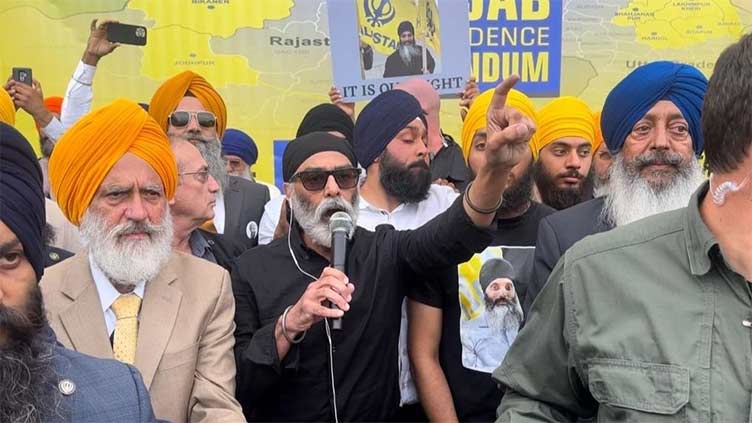Canadian Sikhs set new voting record in Khalistan Referendum

World
The voting took place at the Guru Nanak Sikh Gurdwara where more than 135,000 cast their vote
VANCOUVER, Canada (APP) – More than 135,000 Canadian Sikhs cast their votes in the referendum for the establishment of an independent and sovereign homeland Khalistan, a demand of millions of their community members for which they are struggling for decades.
Organised by the US-based Sikhs for Justice (SFJ), the Khalistan Referendum’s voting campaign started in the United Kingdom in October 2021, and since then, voting events have taken place in more than a dozen European capitals.
The voting procedure was managed by several hundred individuals employed by the independent Punjab Referendum Commission (PRC).
The previous record for the highest turnout was set five months ago in Brompton, Canada. However, the participation of more than 135,000 Sikhs at Surrey, BC, specifically at the Guru Nanak Sikh Gurdwara, surpassed all prior records.
The voting took place at the Gurdwara, which was the site of the tragic assassination of Hardeep Singh Nijjar, the President of Khalistan Referendum Canada and a prominent Sikh activist. Nijjar was assassinated on June 18, 2023, by a group of unidentified individuals. Pro-Khalistan Sikh organizations have alleged the involvement of the Indian government in the murder of the Khalistani advocate.
From the early hours of the morning, thousands of Sikhs from the local community formed lines to participate in the voting process.
The PRC concluded voting at 5 pm, even though more than 40,000 individuals were still waiting in line to cast their votes. Unfortunately, they could not do so due to the stringent timing and international voting regulations.
Dane Waters, the head of the PRC, announced another voting phase on October 29 in Vancouver due to the substantial number of individuals unable to vote.
The voters carried posters featuring Sikh martyrs and voiced both devotional and political slogans in support of Khalistan. The Gurdwara itself was adorned with oversized posters of Hardeep Singh Nijjar, who had served as the president of the same Gurdwara until his tragic assassination.
Addressing the large gathering after the voting concluded, Gurpatwant Singh Pannun, the General Counsel of Sikhs For Justice, stated that the Indian government had once again initiated a conflict with the Sikh community through the assassination of Hardeep Singh Nijjar. He pledged that Sikhs would seek justice for the ruthless murder of Nijjar, emphasizing that he was a peaceful activist who believed in democratic methods.
He stated, “Indian diplomats in Canada, Indian intelligence agencies, along with individuals like Ajit Doval, Amit Shah, and Narendra Modi, bear direct responsibility for the assassination of Hardeep Nijjar. The decline of India’s political influence is becoming increasingly evident. Sikhs are determined to pursue nothing less than the division of India.”
Dr Bakhshish Singh Sandhu, who serves as the President of the Council of Khalistan, said the Sikh community in Canada had unequivocally communicated to the Indian government that they would not yield to its suppression. He emphasized their unwavering commitment to persist in their struggle until achieving independence from Indian rule.
“The substantial turnout underscores that the Khalistan movement is not an isolated issue but a widely supported aspiration among millions of Sikhs,” he added.
Dr Bakhshish Singh Sandhu appreciated the blunt statement made by Canadian Prime Minister Justin Trudeau during his visit to India, where he raised concerns about Indian interference in Canadian affairs with the Modi government.
Before his visit to India for the G20 Summit, Prime Minister Justin Trudeau had stated that he would discuss matters of foreign interference, including those involving India, as part of the G20 Summit agenda.
The Canadian government has made a public accusation of “interference” by the Indian government in Canadian affairs. This claim is supported by Canadian intelligence, which suggests that the Indian state is engaged in meddling within Canada, a country where almost a million Sikhs reside. Among this community, a significant number are perceived as pro-Khalistan and hold anti-Hindutva sentiments.
Prime Minister Trudeau, leading the Liberal government which initiated a public inquiry into accusations of foreign interference, emphasized the significance of investigating all. He expressed, “Our dedication to safeguarding Canadians from any and all types of interference must persist.”
The estimated Sikh population in Canada exceeds 750,000, making it the largest Sikh community outside of India. However, Sikh organisations argue that the actual number surpasses one million, as many Sikhs have chosen Canada as their new home after leaving India.
These referendums, which commenced at the UK’s Queen Elizabeth Centre in October 2021, have been carried out in over two dozen cities across the globe.
These referendums find their origin in the tragic event of Operation Blue Star in 1984. During this operation, the Indian army launched an assault on the holiest Sikh shrine, the “Golden Temple,” with the purported aim of apprehending suspected terrorists. However, this operation led to the loss of innocent Sikh lives and a deep disregard for Sikh sentiments.
Numerous Sikhs sought asylum in nations such as the UK, Canada, Italy, and the United States to evade the insecurity prevailing in their homeland. The Modi administration has faced accusations of mass genocide and extrajudicial killings within the Sikh community. In reaction to these events, Sikh diaspora organisations like Sikhs for Justice (SFJ) have orchestrated referendums, demonstrations, and advocacy campaigns to assert Sikh rights on diverse platforms.

